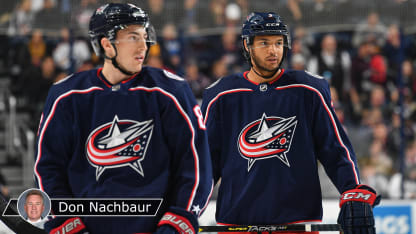Teams approach this in two different ways.
Some will play a passive style offensively that is more geared toward making teams come through their numbers. They win by playing smart, patient, airtight hockey. They prey on forcing mistakes, such as turnovers, odd-man rushes, quick strikes or drawing penalties before capitalizing on the power play.
These teams can frustrate an opponent because they don't give up Grade A scoring chances. The Los Angeles Kings won the Stanley Cup in 2012 with a team that allowed 2.07 goals per game in the regular season and 1.50 per game in the playoffs. They won the Cup in 2014, allowing 2.05 goals per game in the regular season and 2.69 in the playoffs.
They won tight games with opportunistic scoring while maintaining their defensive commitment.
There are other teams that are aggressive offensively. They play fast, attack, transition quickly, forecheck and track back hard. The objective is to spend more time in the offensive zone wearing teams down, which can lead to tired opponents who are less effective offensively.
This is another form of smart defense. The more time spent in the offensive zone, the less time spent in the defensive zone.
The Lightning are one of the teams that play this way. Not only are they excellent off the rush, but they are one of the top teams creating off the forecheck.
By using their speed and numbers to the puck, they force the opposition into mistakes and strike quickly upon puck retrieval. Their game is not built on playing run-and-gun, but rather responsible hockey as they track and defend as well as any team.
The Boston Bruins, Vegas Golden Knights and San Jose Sharks play a similar style but are not as explosive offensively. These teams are built with five-man offense and five-man defense philosophies.
They surround the puck quickly with bodies by working hard to provide support. Whether on the forecheck or getting back into defensive-zone coverage, they outnumber and swarm the opposition. This is only possible when players work to the puck with speed.
The teams that have a commitment to the defensive side of the game understand how it translates to their offensive game. As much as fans, players and coaches love scoring and offense, they also love to win, and defense wins games.
If you can't defend, you don't give yourself a chance to win.
It's a process to win and players need to perform as reliable teammates while buying into the coach's game plan. Little things such as good decisions, finishing checks and blocking shots make a difference. Being committed to play without the puck will lead to increased puck possession and enhance offensive production.
All of this is done in support of the goalie while eliminating chances against. Strong team defensive play, timely scoring and sound goaltending are the foundation for playoff-bound teams.


















